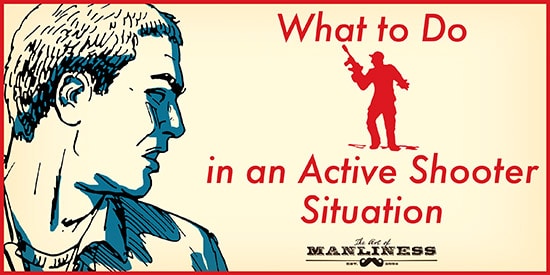 What to Do When Someone Starts Shooting
What to Do When Someone Starts Shooting
It's a sad fact of life in the 21st century that active shootings have
become a regular occurrence in the United States.... While the media
focuses on the firestorm of political debate these events cyclically
create, I've rarely seen them discuss what people are actually supposed
to do in these situations.
The author got in touch with a number of military, tactical, and law
enforcement professionals and asked them, What's an average person
supposed to do when a gunman starts shooting indiscriminately? And they
"all answered the same way."
There was only one piece of advice I disagreed with strongly (see if you
can guess what it is!). Otherwise it seemed like wise advice. But more
interesting to me: the article offers insight into the many
psychological dynamics of such events.
|
| |
 Something Smells Spiritual Here
Something Smells Spiritual Here
Christianity Today associate editor Kate Shellnutt ruminates on the power of smell to evoke memories good, bad, and spiritual. Smell finds a surprising place in Scripture and in the history of theology.
When we smell, we allow a scent to enter our bodies, our brains, and our
memories. And our spirits. Smell is there at our earliest moments—not
just in utero (it's the second sense to develop, after touch) but at
Creation. The first man meets God through smell, a big whiff of life and
energy and Spirit. "Then the LORD God formed a man from the dust of the
ground and breathed into his nostrils the breath of life, and the man
became a living being" (Gen. 2:7).
|
| |
 Topic of the Week: The Fear of Free Speech
Topic of the Week: The Fear of Free Speech
This week I couldn't get away from screeds aimed at college students who
cower before "microaggressions" and "feel unsafe" when certain subjects
are raised in the classroom. They are an easy target, of course, as are
the administrators who bend to their hypersensitive feelings. But that
wasn't the response of the president of Oklahoma Wesleyan
when a student felt offended when a chapel preacher, explaining 1
Corinthians 13, made him feel bad for not showing love. Nor of some
Princeton University students who said enough is enough: " We stand for academic freedom and open dialogue."
This same week, well-known author Wendell Berry called out the University of Kentucky
for hiding a beautiful fresco in Memorial Hall because of its supposed
racial insensitivity. He futilely reminded the university that the
fresco was actually a crucial history lesson about racism. He happens to
have known the artist and the reason she created the fresco in the
first place.
Then there was this sobering essay that argues that silencing dissent is not confined to university campuses but also corporate offices.
The upside of all this: while some in our society strive valiantly to
limit free speech, others vigorously continue to defend it! The fact
that we are witnessing such a raucous debate over the issue signals
that not all is lost.
|
| |
|
|
| |
|
|
| |
|
|
|































No comments:
Post a Comment